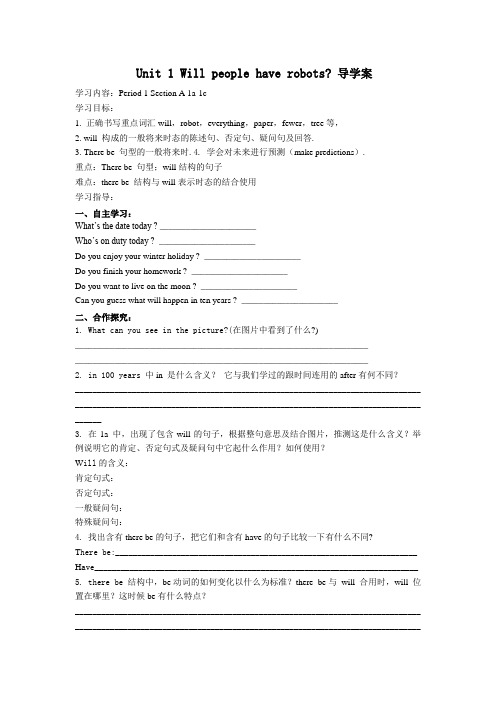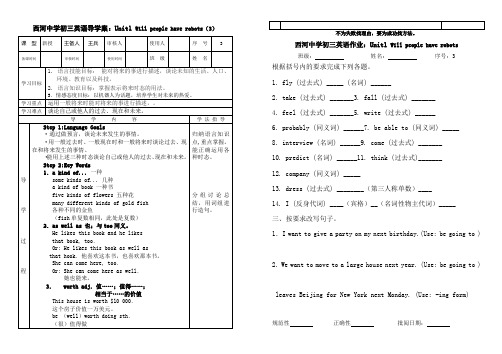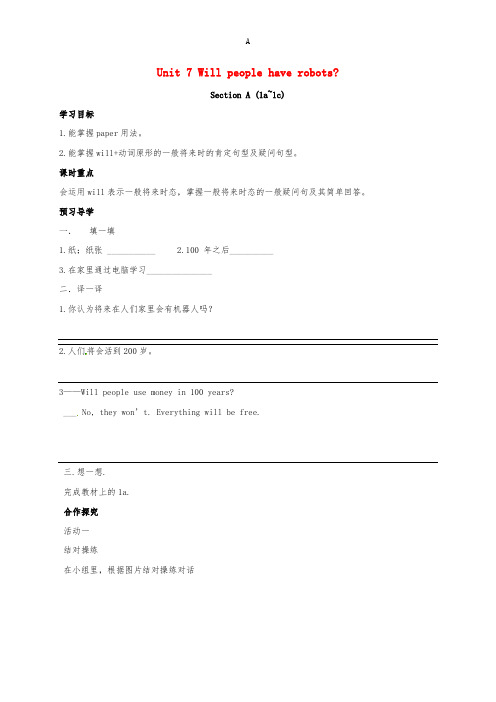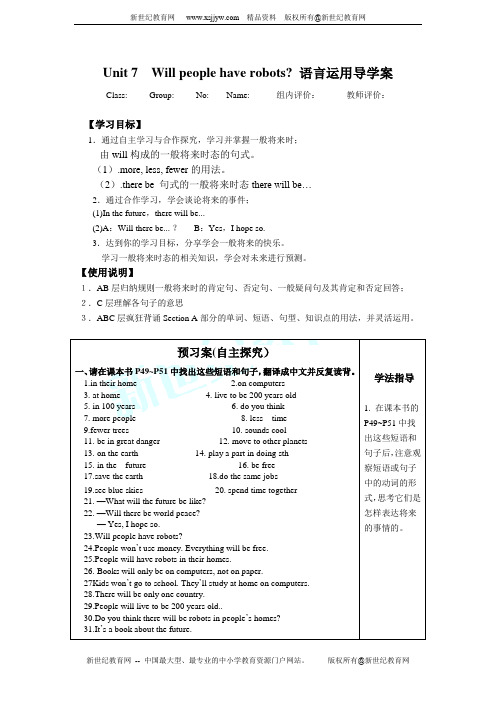Unitl_will_people_have_robots导学案AlqUMK
- 格式:doc
- 大小:34.50 KB
- 文档页数:3

Unit 1 Will people have robots?导学案学习内容:Period 1 Section A 1a-1c学习目标:1. 正确书写重点词汇will,robot,everything,paper,fewer,tree等,2. will 构成的一般将来时态的陈述句、否定句、疑问句及回答.3. There be 句型的一般将来时.4.学会对未来进行预测(make predictions).重点:There be 句型;will结构的句子难点:there be 结构与will表示时态的结合使用学习指导:一、自主学习:What’s the date today ? ______________________Who’s on duty today ?______________________Do you enjoy your winter holiday ?______________________Do you finish your homework ?______________________Do you want to live on the moon ?______________________Can you guess what will happen in ten years ?______________________二、合作探究:1. What can you see in the picture?(在图片中看到了什么?)______________________________________________________________________________________________________________________________________2. in 100 years 中in 是什么含义?它与我们学过的跟时间连用的after有何不同?_______________________________________________________________________________ _______________________________________________________________________________ ______3. 在1a 中,出现了包含will的句子,根据整句意思及结合图片,推测这是什么含义?举例说明它的肯定、否定句式及疑问句中它起什么作用?如何使用?W ill的含义:_______________________________________________________________肯定句式:__________________________________________________________________否定句式:__________________________________________________________________一般疑问句:________________________________________________________________特殊疑问句:________________________________________________________________4. 找出含有there be的句子,把它们和含有have的句子比较一下有什么不同?T here be:_____________________________________________________________________H ave__________________________________________________________________________5. there be 结构中,be动词的如何变化以什么为标准?there be与will 合用时,will 位置在哪里?这时候be有什么特点?_______________________________________________________________________________ ______________________________________________________________________________________________________________________________________________________________ _______________________________________________________________________________ _______________________________________________________________________________ 6. Finish 1a and make more predictions.______________________________________________________________________________________________________________________________________7. Finish 1b. Read tapescripts.三、拓展延伸:模仿说几句表示推测的意思的句子,对自己的生活或未来尝试推测或展望一下._______________________________________________________________________________ _______________________________________________________________________________ _______________________________________________________________________________ _______________________________________________________________________________四、当堂检测:1.I think he _____go tomorrow morning.A. wasB. isC. hasD. will2.There_____ a football match tomorrow in our school.A. will beB. haveC. hasD. was3.Many people _________ 100 years old today.A. live toB. lived to beC. live to beD. live4. I think Jim is a good student.(改为否定句)I ________ think Jim ________ a good student.5. They will go to the park this weekend. (改为否定句和一般疑问句)They ________go to the park this weekend.________ they_________ to the park this weekend?6. My grandmother died when she was fifty years old. (同义句转化)My grandmother ________________ ________ fifty years old.五、自我评价及反馈。

西河中学初三英语导学案:Unit1 Will people have robots(3)
不为失败找理由,要为成功找方法。
西河中学初三英语作业:Unit1 Will people have robots
班级:姓名:序号:3
根据括号内的要求完成下列各题。
1. fly (过去式) _____ (名词) ______
2. take (过去式) _______
3. fall (过去式) _______
4. feel (过去式) _______
5. write (过去式) ______
6. probably (同义词) ______
7. be able to (同义词) _____
8. interview (名词) ______9. come (过去式) _______
10. predict (名词) ______11. think (过去式)_______
12. company (同义词) _____
13. dress (过去式) ________(第三人称单数)____
14. I (反身代词) ____(宾格)__(名词性物主代词)_____
三、按要求改写句子。
1.I want to give a party on my next birthday.(Use: be going to ) 2. We want to move to a large house next year. (Use: be going to ) leaves Beijing for New York next Monday. (Use: -ing form)
规范性正确性批阅日期:。

教案:八年级英语下册《Unit Will people have robots》教案人教版一、教学目标1. 知识目标学生能够理解并运用目标句型"Will people have robots?" 进行询问和回答。
学生能够掌握表示将来的助动词"will" 的用法。
学生能够理解并运用词汇"robots, future, technology, advance, dly life" 等。
2. 能力目标学生能够听懂并能够运用目标句型进行简单的交流。
学生能够通过阅读和听力材料,提高获取信息的能力。
3. 情感目标学生能够激发对未来的好奇心,培养探索科技的兴趣。
二、教学重难点1. 重点目标句型"Will people have robots?" 的运用。
表示将来的助动词"will" 的用法。
2. 难点目标句型的适当变体和运用。
词汇"robots, future, technology, advance, dly life" 的运用。
三、教学方法采用任务型教学法,通过听、说、读、写等多种活动,让学生在实际语境中运用目标句型和词汇。
四、教学步骤1. 导入利用图片或实物展示的图片,引导学生谈论。
2. 新课呈现通过动画或视频展示未来的情景,引导学生理解并掌握目标句型"Will people have robots?"。
3. 操练学生两人一组,用目标句型进行问答,教师巡回指导。
4. 练习设计阅读材料,让学生通过阅读理解并运用目标句型。
5. 输出学生分组讨论,设想未来的,并用目标句型进行交流。
五、课后作业1. 抄写目标句型"Will people have robots?" 并进行问答练习。
2. 收集有关的资料,进行阅读理解练习。
3. 家庭作业:以小组为单位,编写一篇关于未来的短文,并展示给全班同学。

Will people have robots?一、教学目标1.学生能够掌握关于未来生活和机器人的词汇和表达方式。
2.学生能够运用一般将来时表达对未来的预测和想象。
3.培养学生的创新思维和科学幻想能力。
二、教学重难点1.重点:掌握未来生活和机器人的词汇,如robot,in the future,live to be...;一般将来时的构成和用法,如will+动词原形。
2.难点:正确运用一般将来时表达对未来的预测和想象,并说明理由。
三、教学方法情景教学法、小组合作法、讨论法。
四、教学过程1.导入1.播放一段关于机器人的视频,引出话题“Will people have robots?”。
2.提问学生对未来生活的想象,以及是否认为人们在未来会拥有机器人。
2.新课呈现1.学习未来生活和机器人的词汇:通过图片、例句等方式展示robot,in the future,live to be...等词汇,并让学生理解其含义和用法。
2.学习一般将来时的构成:通过举例、归纳等方式让学生掌握一般将来时的构成规则,即will+动词原形。
3.学习一般将来时的用法:通过例句、对话等方式让学生理解一般将来时的句型结构,如肯定句:主语+will+动词原形;否定句:主语+won't+动词原形;一般疑问句:Will+主语+动词原形?及其回答:Yes,主语will./No,主语won't.3.练习巩固1.小组活动:学生分组,讨论未来生活的样子,并使用一般将来时进行描述。
2.游戏环节:“未来大猜想”,教师出示一些关于未来生活的图片,学生用一般将来时进行猜测和描述。
4.拓展延伸1.讨论机器人的优缺点:引导学生思考机器人在未来生活中的作用和影响,以及可能带来的问题和挑战。
2.写作练习:让学生根据自己的想象,写一篇关于未来生活和机器人的短文。
5.课堂总结1.回顾本节课所学的未来生活和机器人的词汇以及一般将来时的构成和用法。
2.强调创新思维和科学幻想能力的重要性。

Unit 7 Will people have robots?Section A (1a~1c)学习目标1.能掌握paper用法。
2.能掌握will+动词原形的一般将来时的肯定句型及疑问句型。
课时重点会运用will表示一般将来时态,掌握一般将来时态的一般疑问句及其简单回答。
预习导学一.填一填1.纸;纸张 ___________2.100 年之后__________3.在家里通过电脑学习_______________二.译一译1.你认为将来在人们家里会有机器人吗?2.人们将会活到200岁。
3——Will people use money in 100 years?___ No, they won’t. Everything will be free.三.想一想.完成教材上的1a.合作探究活动一结对操练在小组里,根据图片结对操练对话1. 2. 3. 4.完成任务所需的语言结构:1.A: What are you going to be in the future?B: I’m going to be a(n)…2.完成教材上1a、1b的听力题。
活动二我是预言家你能对未来10年、20年、50年或100年进行预测吗?在小组里发挥你的想象,也许你的预言在不久的将来就会成为现实。
完成任务所需的语言结构:A1: People won’t use money. Everything will be free.A2: Books will only be on computers, not on paper.A3: Kids won’t go to school. They’ll study at home on computers.A4: There will only be one country. Peopl e will live to be 200 years old.…活动三在小组里,根据图片结对操练含will 的一般疑问句,每组派代表进行展示。

Unit 7 Will people have robots? 语言运用导学案Class: Group: No: Name: 组内评价:教师评价:【学习目标】1.通过自主学习与合作探究,学习并掌握一般将来时;由will构成的一般将来时态的句式。
(1).more, less, fewer的用法。
(2).there be 句式的一般将来时态there will be…2.通过合作学习,学会谈论将来的事件;(1)In the future,there will be...(2)A:Will there be... ? B:Yes,I hope so.3.达到你的学习目标,分享学会一般将来的快乐。
学习一般将来时态的相关知识,学会对未来进行预测。
【使用说明】1.AB层归纳规则一般将来时的肯定句、否定句、一般疑问句及其肯定和否定回答;2.C层理解各句子的意思3.ABC层疯狂背诵Section A部分的单词、短语、句型、知识点的用法,并灵活运用。
预习案(自主探究)一、请在课本书P49~P51中找出这些短语和句子,翻译成中文并反复读背。
1.in their home _____________2.on computers _______________3. at home ______________4. live to be 200 years old_____________5. in 100 years________________6. do you think _______________7. more people_______________8. less time____________9.fewer trees ______________ 10. sounds cool _____________ 11. be in great danger ________ 12. move to other planets_________ 13. on the earth________ 14. play a part in doing sth_______________ 15. in the future________________ 16. be free__________________ 17.save the earth_______________18.do the same jobs______________ 19.see blue skies_____________ 20. spend time together____________21. —What will the future be like? _______________________22. —Will there be world peace? _______________________— Yes, I hope so. __________23.Will people have robots? _____________________24.People won’t use money. Everything will be free.25.People will have robots in their homes.26. Books will only be on computers, not on paper.27Kids won’t go to school. They’ll study at home on computers.28.There will be only one country.29.People will live to be 200 years old..30.Do you think there will be robots in people’s homes?31.It’s a book about the future.学法指导1. 在课本书的P49~P51中找出这些短语和句子后,注意观察短语或句子中的动词的形式,思考它们是怎样表达将来的事情的。
八年级上册ill peple have rbts?导学案八年级上册illpeplehaverbts?导学案一、教学目标:1语言知识目标:1)能把握以下单词:paper,pllutin,preditin,future,pllute,envirnent,planet,ear th,plant,part,plaapart2)能把握以下句型:①hatillthefuturebelie?itiesillberepllutedAndthereillbefeertrees②illpepleusenein100ears?③illthereberldpeae?④idsillstudathenputers⑤Then’tgtshl⑥ThereillberepepleThereillbefeertrees⑦ThereillberepllutinThereillbelessfreetie2)能了解以下语法:ill+动词原形来表达一样以后时态。
3)学会表达自己对以后的观点;学会谈论自己以后的打算。
2情感态度价值观目标:通过引导学生展望以后,及对以后生活的设计,来达到前景教育的目的,同时也通过对前景的假想,让学生在潜移默化中检讨自己的现状,使之对目前的学习、生活适应作适当的调整,并非断的改善自己的现状,使学生的理想观和价值观更为科学,更具进展价值。
二、教学重难点1教学重点:1)学习把握一样以后时态的意义和结构,“ill+动词原级”用法。
2)把握Therebe句型的一样以后时态的结构。
2教学难点:把握re/feer;re/less的用法。
情态动词“ill+动词原形”来表达一样以后时态。
三、教学进程ⅠLead-in1FreeTal:让学生们说出谈论自己的以后的工作,对工作的打算等,hatduanttbehenugrup?Ss:IanttbeasientistT:Hareugingtdthat?Ss:I’gingtstudsienehard…(温习Unit6单元知识begingtd句型来描述以后打算。
课题 Unit 7 Will people have robots?(Section A 1a-2c)(第1课时)一、学习目标1.熟练掌握词汇:future,environment,planet,building,play a part,world peace2.熟练掌握以下句型 (1)In the future,there will be...(2)A:Will there be... ? B:Yes,I hope so.3.学习一般将来时态的相关知识,学会对未来进行预测。
二、重点,难点:◆重点由will构成的一般将来时态的句式。
◆难点 1.more,less,fewer的用法。
2.there be 句式的一般将来时态there will be…三、自主学习Step 1 Review (忆一忆):1.你认为人们家里将会出现机器人吗?_________________________________2.孩子们将会去学校上学吗?__________________________________________3.他们将在自己家里通过电脑学习。
_____________________________________4.人们将可以活到200岁。
_____________________________________________5.将会有更少的人。
__________________________________________________6.机会有更少的空闲时间。
_________________________________________7.将会有更多的污染。
_______________________________________________Step 2 learning new words and key phrases (单词、短语)1. in the future__________2.be in great danger___________3. move to ____________4.play a part in doing sth _________5. save the earth_______________6.see blue skies_____________7. spend time together_________________Step 3 Difficult sentences showing(重难点展示)1.in ten years的汉语意思为________________,用于__一般将来时态__(时态)。
Unit 1 Will people have robots ?Period One主备人:备课时间: 第一周拟使用时间:第二周教师寄语: A good beginning is half done.学习目标:1.知识目标:掌握Section A 的生词,理解课本中的句子。
2.能力目标:学习一般将来时will的用法。
(重点)能谈论过去、现在和将来。
3.情感目标:培养学生敢于预测未来的能力。
Step 1: 预习导航:(1)记住下列单词Will,will not=won’t, robot, everything, paper, fewer, pollution, building (2)预习课本,读懂1a-4中的句子(3)预习检查100年后的世界将有怎样的不同?请提供5种不同的答案1._______________________________________________________2._______________________________________________________3._______________________________________________________4._______________________________________________________5. ______________________________________________________(4)小组互相检查答案Step 2:自主合作探究仔细思考,回答下列问题1. 本单元学习的一般将来时,动词的形式是:____________________________________2. will 缩写是___________ will not的缩写是________Eg: I will (缩写)_________ they will (缩写)__________3. 在什么情况下用一般将来时态:____________________________________________4.一般将来时的句子,怎样改否定句?______________________________________Eg: People will have robots in their homes. (改否定句)_________________________________________________________________________. 5.一般将来时的句子,怎样改一般疑问句?______________________________________Eg: There will only be one country. (改一般疑问句并做肯定和否定回答)___________________________________________________________________?________________________ ___________________________6.写出下列形容词的原级more ______________________ less __________ fewer ___________7.区分much、many、little 和few的不同。
2011学年第二学期作业设计竞赛
学科:英语设计人:7
Unit l Will people have robots ? ( section A 1a-2c)
(一)学习要点
1.教学内容section A 1a-2c
2.教学目标(学会并掌握新授知识):
单词:will, won’t,robot, everything ,paper, fewer, pollution ,tree
短句:be free, be on computer, study at home, live to be, in 100 years.
句型:1)---Will people use money in 100 years?
---No , they won’t, Everything will be free. Will people live to be 200 years old?
---Yes, they will.
2) There will be more people. 3) There will be less free time
4) There will be fewer tress.
3.学习重点:1)一般将来时(will/won’t). 2)there will be句型
4.学习难点:用more less fewer 修饰名词。
(二)课前预测
1.翻译短语:
在家学习免费的活到200岁
更多的人更少的污染更少的汽车
2.翻译句子:
人们的家里将会有机器人
一切东西都将是免费的
将会只有一个国家
人们将活到200岁
将会有更少的水
(三)课内知识巩固
1.课堂讨论:
1.Do you think there will be robots in people’s homes?
2.Will people live longer? How old do you think they will live to be? Why?
3.Will there be more or less pollution? Why do you think so?
2.反馈练习:
1. Betty (write) to her parents tomorrow.
2. They (not have) any classes next week.
3.There are (更少)girls than boys in our class.
4.Do you think there will be (更少) pollution in the future?
5.Everyone will (有) an English book next week
6.She will be a teacher (填一个适当的介词) two years.
3.提高训练
1.Mr. Smith will move to Shanghai in a week.(对划线部分提问)
2.Will there be more trees?(做肯定回答)
3. They clean the classroom every day.(用tomorrow 代替every day)
4.be, robots, homes, will, people’s ,there ,in(?)
4.学生们将会在家里在电脑上学习。
(翻译句子)
(四)课后拓展延伸
1.单项选择
( )1.There a basketball match tomorrow afternoon.
A. is
B. will be
C. will have
D. is going to have
( )2.---Are you ready?---Not yet . I be ready in five minutes.
A.will
B.will not
C.am
D.was
( )3.I have ________paper and _______housework than he.
A fewer, less
B less ,fewer
C fewer, fewer
D less, less
( )4 She will come back________ three years.
A after
B before
C in
D for
( )5 kids willl study_______home ________computers in the future.
A in on
B on in
C at on
D at from
( )6 We _______a class meeting next week.
A are
B will be
C have
D are going to have
( )7 Mr. Wang _________Shanghai tomorrow morning.
A leaves for
B left for
C is leaving for
D has left for
2.用there be 或have 的适当形式填空
1 .an English evening tomorrow.
2. you any questions about the earthquake?
3.I a pet dog when I was eight years old.
4. no schools in this village twenty years ago
5.In 20 to 25 years, more rooms everywhere and humans less work to do
6. a ruler, a pen and many other school things in my pencil –box.
7.--- more buses in the future? --No,
3.用所给词的适当形式填空
1.I think there will be (little) time left if he comes late
2.There will be (many) computers than books
3.The sun always shines (bright) at this time of year
4.You’d better (go) to bed now. It’s late
5.There will be (few) farmers than before
(五)课后小结
1.对于will 引导的一般将来时态的结构和用法,你有什么疑问?
2.我们以前还学过哪两种表达将来的方式,你可以列出来吗?
a)
b)
答案
翻译短语:
Study at home be free live to be 200 years old more people less pollution fewer cars
翻译句子:
People will have robots in their homes
Everything will be free
There will only be one country
People will live to be 200 years old
There will have less water
反馈练习
Will write won’t have fower less have in
提高训练
How soon will Mr.smith move to shanghai?
Yes,there will
They will clean the classroom tomorrow
Will there be robots in people’s homes?
Students will study at home on computers
课后拓展延伸
B A D
C C
D C
用there be 或have 的适当形式填空
There will be Do have had were there will be will have Have Will there be there won’t
用所给词的适当形式填空
Less more brightly go fewer
作业设计意图:通过课前预测,了解课文内容。
经过课堂讨论,作业练习,巩固课内知识。
课后拓展延伸,加深印象。
课后小结,回顾知识。